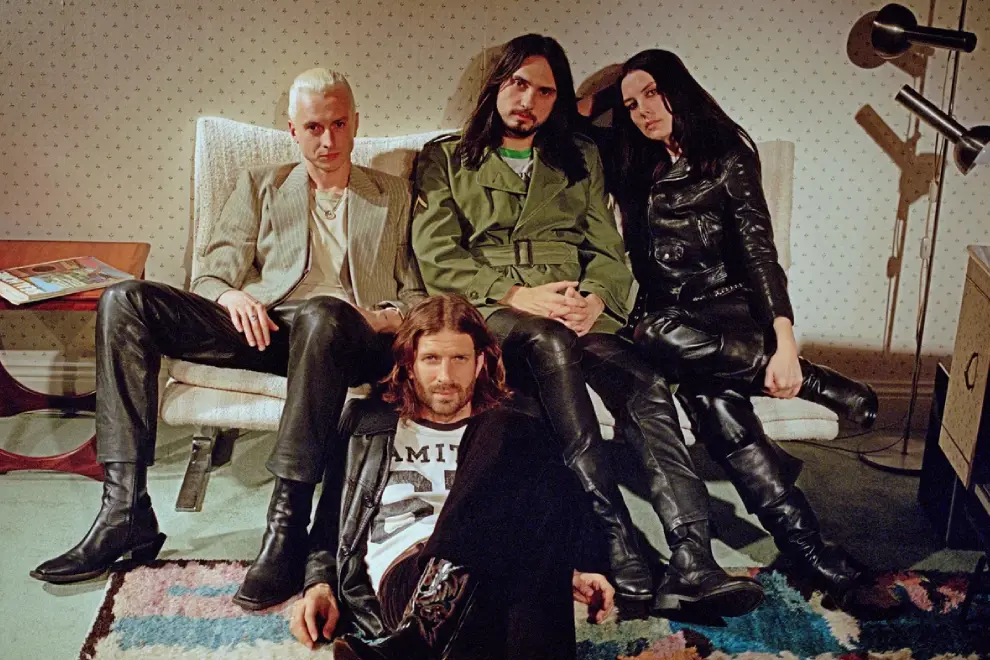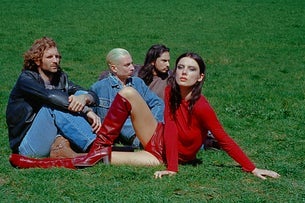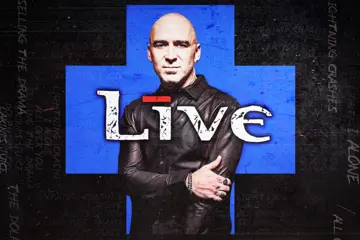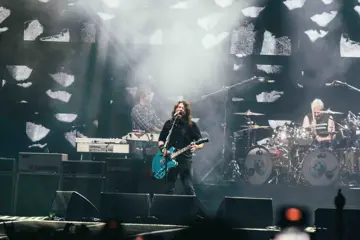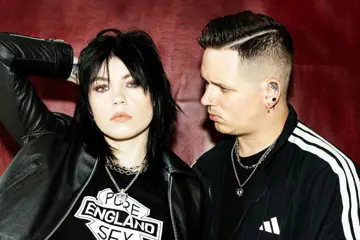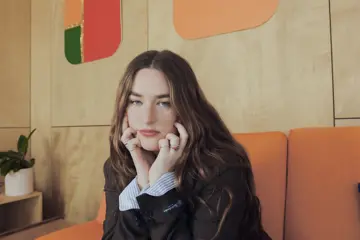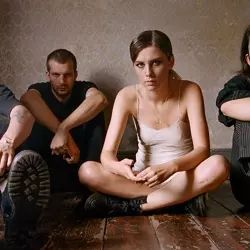 Wolf Alice
Wolf AliceWolf Alice have embraced the spirit of reinvention.
Never a band to make the same album twice or repeat any ideas, the band’s fourth album, The Clearing, out this Friday, offers a moment of pure peace.
Since their formation in 2010 – originally as an acoustic duo comprising vocalist Ellie Rowsell and guitarist Joff Oddie, welcoming drummer Joel Amey and bassist Theo Ellis in 2012 – the British outfit’s music has worn many expressions, from grunge-inspired epics to dream pop, folk, shoegaze, and alternative rock.
Their debut album, My Love Is Cool, was released in June 2015 and was nominated for the 2016 Mercury Music Prize. Featuring singles Giant Peach and You’re A Germ and earlier recorded singles Bros, Fluffy, and Moaning Lisa Smile—and the fan-favourite Silk, which featured in the T2 Trainspotting soundtrack—My Love Is Cool showcased a band full of confidence, some attitude, and a whole lot of talent.
With 2017’s Visions Of A Life, Wolf Alice became one of the most impressive rock bands in the world, emanating the sense of foreboding and musicianship of Black Sabbath on the title track, riot grrrl on Yuk Foo, sincere, anthemic balladry on Don’t Delete The Kisses, and stunning takes on shoegaze (Heavenward) and punk (Space & Time). The album debuted at #2 in the UK, and the band received the 2018 Mercury Music Prize.
Don't miss a beat with our FREE daily newsletter
Wolf Alice’s third album, Blue Weekend, arrived to international critical acclaim in 2021. Once again showcasing their penchant for experimenting, the album was preceded by the piano-led, Beatles-esque The Last Man On Earth, punky Smile, and two stunning ballads, No Hard Feelings and How Can I Make It OK?.
This week, Wolf Alice release their fourth album, The Clearing. Their first album to be released with Columbia Records, the LP finds the band slowing down and incorporating additional piano and acoustic guitar melodies, while honing in on their songwriting. Their aim? Making a timeless album.
Looking to Fleetwood Mac as much as Black Sabbath for inspiration—the band inserted passages of The White Stripes’ Seven Nation Army and Black Sabbath’s Iron Man towards the end of Giant Peach at their brilliant Glastonbury 2025 performance—The Music chats to Oddie and Amey ahead of the release of The Clearing.
“I love metal; we were listening to a bit of Sabbath yesterday, actually, weren’t we? In the photo shoot?” Amey shares, revealing that metal was his entry point to alternative music as a teenager.
“On a personal note, when I was first getting into my own music as a teenager, metal was quite mainstream. If you were into alternative music, it was probably going to be like metal, you know? My first CD was Linkin Park—it was a real gateway into alternative [music], and I got into more punky kind of stuff from there.
“And then, weirdly, everything, for some reason, eventually leads back to Fleetwood Mac or Black Sabbath [laughs]. But, yeah, I do like a bit of metal; it was really fun actually doing that at the end [at Glastonbury] and RIP, Ozzy, obviously.”
Upon announcing the album, Rowsell explained that with The Clearing, she “visualised a moment of peace.”
She added, “I also think if you come into a clearing in the woods, it’s never at the end of the woods. You’re not out of the woods yet, but you have relief.” With their fourth album, Wolf Alice get past those periods of finding one’s identity in their twenties via half-laments and half-shrugs.
The Clearing is simultaneously serious, wry, and playful; presenting sounds pulled from the ‘70s while firmly rooted in the present. As a press release notes, the album captures a vibe of “If Fleetwood Mac wrote an album today in North London, you’d get somewhere close to these 11 effortlessly grand tracks.”
The Clearing saw Wolf Alice team up with mega producer Greg Kurstin (Adele, Sia, Foo Fighters), who complemented Rowsell’s piano-playing abilities with additional, charming flourishes on the keys. Amey explained that when Rowsell and Kurstin played together in the studio, it “killed” him, as the melodies pouring out of the pair were “so gorgeous.”
The Clearing
— Wolf Alice (@wolfalicemusic) August 15, 2025
This time next week...https://t.co/wppdAINHBd pic.twitter.com/NDE5ilwQFm
Describing Kurstin as a “brilliant facilitator” and a producer “at the top of his game,” Oddie says Kurstin actively listened and responded to the band, recognising that they aren’t newbies in music.
“He paid that a lot of respect,” Oddie notes, “And we wanted to make something that sounded warm and a bit analogue and, you know, maybe doesn’t have as many layers and things like that. And he really took that on board, and he spent a lot of time just trying [to] nail that.”
Written in Seven Sisters, North London, Kurstin entered the Los Angeles studio to record the album with a tape machine. He informed the band that The Clearing needed to be recorded to tape. “He was so encouraging during takes, and he’s a fantastic musician,” Oddie adds.
“So, he had the skill set that he could easily do it for you, but it was not about that. It was about him trying to get the best out of you. That’s why I see him as a facilitator. He was honestly the loveliest man; just such a sweet, sweet guy. He could warrant having the most enormous ego in the world, but he’s very, very humble.”
Oddie explains that much of the album was written on the piano after Rowsell purchased a piano. “I know Ellie bought a piano and has one where she lives and worked a lot on that. There is quite a lot of electric [guitar]... I think what there’s not, maybe, is the kind of aggressive, kind of fuzzed out, distorted kind of stuff that has been on previous records. I’m not sure… it probably just didn’t feel appropriate with the songs we were working with.”
He adds, “It didn’t feel like it needed it, really. This album is in a different place. That’s not to say we wouldn’t do that stuff again [or that] we’ve turned our back on it whatsoever, but yeah, I don’t think it felt appropriate this time.”
Of course, some moments on the album call back to the past, such as Midnight Song acting as the sibling to Vision Of A Life’s After the Zero Hour. The lovelorn Leaning Against the Wall could be played alongside Bros and Silk, while Bread Butter Tea Sugar takes the glam rock riffing of The Last Man on Earth to a new level.
This is a band that’s let go of fear and any semblance of imposter syndrome, and for fans willing to give the album a go, there are many delicious things to enjoy. There’s no Play The Greatest Hits on this album, and The Clearing would be poorer if Wolf Alice tried to insert a random punk song within it.
Oddie explains that the tracklist for The Clearing came together “based on vinyl” and how the band thought the album would flow in that format.
“Weirdly, we put the tracklisting together based on vinyl, based on how we thought that would flow,” he shares. “And I know that’s probably only a very small percentage of the people that will listen to it [like that], but we wanted to… I don’t know; we all love albums. We all think they’re really important. So, you know, it’s put together to listen to as an album. So, regardless of how it’s listened to, I hope that people do give it a go from top to bottom.”
Amey concurs, adding that it’s a “nice experience” listening to The Clearing more than once and picking up on the different ideas presented throughout the album.
“It’s a nice experience. I don’t always do it [play an album in full], you know? It’s kind of a large ask, isn’t it, to put aside, like, 45 minutes of uninterrupted time to just focus on this thing. In the modern world, it can be tricky, but it is such an experience when you can and when you do have an experience with music and like you say, you maybe do hear things I didn’t hear the first time round.”
The wild Bloom Baby Bloom sees Rowsell stretching her vocals to grand new heights, featuring falsetto and the top of her range, all in under four minutes. The band also fires on all cylinders for the shock lead single.
“I wanted a rock song, to focus on the performance element of a rock song and sing like Axl Rose, but to be singing a song about being a woman,” Rowsell explained upon the song’s release.
“I’ve used the guitar as a shield in the past, playing it has perhaps been some way to reject the ‘girl singer in band’ trope, but I wanted to focus on my voice as a rock instrument so it’s been freeing to put the guitar down and reach a point where I don’t feel like I need to prove that I’m a musician.”
Amey reflects on the single, “I think confidence was quite a keyword for keeping things moving forward; I think we were trying to be cohesive. We were still experimenting, but Bloom Baby Bloom still kind of made sense with what we were trying to do.
“It was led by a piano when Ellie had the original demo. The keyword was the performance aspect of the song. The original demo was less structured than the way that it is. It was basically a longer version. And Greg helped us sculpt that when we were in the studio with him; it just felt exciting, rather than strange or anything like that. It still felt like it could be part of this world if we just kept chipping away.”
And the great music video? Amey loves it, too. “The video is fucking fun. Really fun. I literally just sat for, I don’t know, like, nine hours on the drums, [while] all these dancers [were] just doing their thing all day around me.”
Album opener Thorns, simultaneously grandiose and tender, explores Rowsell’s perceived narcissism for writing break-up songs and penning another one. Play It Out ruminates on possible motherhood, Just Two Girls captures the energy of female friendships, and lead single Bloom Baby Bloom is all about empowerment.
But the one-two punch of closing tracks White Horses—featuring Amey on lead vocals for the first time since My Love Is Cool’s Swallowtail—and The Sofa, which tinkers away with psychedelic rock and gentle introspection, are two of the album’s most gorgeous moments.
“Oh, I love sharing the mic with Ellie,” Amey tells. “I mean, we’ve all sung on various records throughout the years and live. Since day one, I’ve always tried to put on my best ‘pretend to be Ellie’ backing vocal live. It was wicked because I had it [White Horses] started off as a demo, but it just blossomed into this duet when I gave it to the band.
“It was really worked on by the four of us to become what it is today. I just thought, ‘Yeah, this is really thrilling.’ It was a huge aspect when we first started the writing sessions—the first song when we started [the album] was Passenger Seat, and that has quite a few vocals with the background. We were trying to do them all in the room together.
“We had guitars, so it was a huge aspect of The Clearing. It was like, ‘Okay, if we’re going to do singing, let’s not just double-track everyone’s voice 1,000 times.’ So, it felt really fitting to be singing that song together. You know, we didn’t second-guess it.”
The Clearing will be released on Friday, 22 August, via RCA/Mushroom Music. You can pre-order/pre-save the album here.

